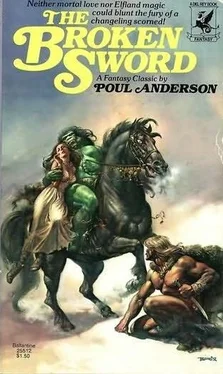Poul Anderson - The Broken Sword
Здесь есть возможность читать онлайн «Poul Anderson - The Broken Sword» весь текст электронной книги совершенно бесплатно (целиком полную версию без сокращений). В некоторых случаях можно слушать аудио, скачать через торрент в формате fb2 и присутствует краткое содержание. Жанр: Фэнтези, на английском языке. Описание произведения, (предисловие) а так же отзывы посетителей доступны на портале библиотеки ЛибКат.
- Название:The Broken Sword
- Автор:
- Жанр:
- Год:неизвестен
- ISBN:нет данных
- Рейтинг книги:3 / 5. Голосов: 1
-
Избранное:Добавить в избранное
- Отзывы:
-
Ваша оценка:
- 60
- 1
- 2
- 3
- 4
- 5
The Broken Sword: краткое содержание, описание и аннотация
Предлагаем к чтению аннотацию, описание, краткое содержание или предисловие (зависит от того, что написал сам автор книги «The Broken Sword»). Если вы не нашли необходимую информацию о книге — напишите в комментариях, мы постараемся отыскать её.
The Broken Sword — читать онлайн бесплатно полную книгу (весь текст) целиком
Ниже представлен текст книги, разбитый по страницам. Система сохранения места последней прочитанной страницы, позволяет с удобством читать онлайн бесплатно книгу «The Broken Sword», без необходимости каждый раз заново искать на чём Вы остановились. Поставьте закладку, и сможете в любой момент перейти на страницу, на которой закончили чтение.
Интервал:
Закладка:
He looked at her through the strange slant eyes of the elves, all cloudy-blue without whites or a readily seen pupil. There were little moon-flecks drifting in Imric’s eyes, and shadows of ancient knowledge, for he had dwelt long in the land. But he was ever youthful, with the broad forehead and high cheekbones, the narrow jaw and straight thin-chiselled nose of the elf lords. His hair floated silvery-gold, finer than spider silk, from beneath his horned helmet down to the wide red-caped shoulders.
“Not often of late lifetimes have the elves gone forth among men,” said the witch.
“Aye, we have been too busy in our war with the trolls,” answered Imric in his voice that was like a wind blowing through trees far away. “But now truce has been made, and I am curious to find what has happened in the last hundred years.”
“Much, and little of it good,” said the witch. “The Danes have come from overseas, killing, looting, burning, seizing for themselves much of eastern England and I know not what else.”
“That is not bad.” Imric stroked his moustache. “Before them, Angles and Saxons did likewise, and before them Picts and Scots, and before them the Romans, and before them Brythons and Goidels, and before them—but the tale is long and long, nor will it end with the Danes. And I, who have watched it almost since the land was made, see naught of harm in it, for it helps pass the time. I would fain see these newcomers.”
“Then you need not ride far,” said the witch, “for Orm the Strong dwells on the coast, distant from here by the ride of a night. Or less on a mortal horse.”
“A short trip for my stallion. I will go.”
“Hold—hold, elf!” For a while the witch sat muttering, and her eyes caught what light came from the tiny fire on the hearth, so that two red gleams moved amidst the smoke and shadows. Then of a sudden she cackled in glee and screamed, “Aye, ride, ride, elf, to Orm’s house by the sea. He is gone a-roving, but his wife will guest you gladly. She has newly brought forth a son, who is not yet christened.”
At these words Imric cocked his long, pointed ears forward. “Speak you sooth, witch?” he asked, low and toneless.
“Aye, by Sathanas I swear it. I have my ways of knowing what goes on in that accursed hall.” The old woman rocked to and fro, squatting in her rags before the dim coals. The shadows chased each other across the walls, huge and misshapen. “But go see for yourself.”
“I would not venture to take a Dane-chiefs child. He might be under the Asir’s ward.”
“Nay. Orm is a Christian, though an indifferent one, and his son has thus far been hallowed to no gods of any kind.”
“Ill is it to lie to me,” Imric said.
“I have naught to lose,” answered the witch. “Orm burned my sons in their house, and my blood dies with me. I do not fear gods or devils, elves or trolls of men. But ’tis truth I speak.”
“I will go see,” said Imric, and stood up. The rings of his byrnie chimed together. He swept his great red cloak around him, went forth and swung on to the white stallion.
Like a rush of wind and a blur of moonlight he was out of the woods and across the fields. Widely stretched the land, shadowy trees, bulking hills, rime-whitened meadows asleep under the moon. Here and there a steading huddled dark beneath the vast star-crusted sky. Presences moved in the night, but they were not men—he caught a wolf-howl, the green gleam of a wildcat’s eyes, the scurry of small feet among oak roots. They were aware of the elf-earl’s passage and shrank deeper into the gloom.
Erelong Imric reached Orm’s garth. The barns and sheds and lesser houses were of rough-hewn timbers, walling in three sides of a stone-paved yard. On the fourth, the hall raised its gable ends, carved into dragons, against the star clouds. But Imric sought the small lady-bower across from it. Dogs had smelled him, bristled and snarled. Then before they could bark he had turned his terrible blind-seeming gaze on them and made a sign. They crawled off, barely whimpering.
He rode like a wandering night-wind up to the bower. By his arts he unshuttered a window from without, and looked through. Moonlight shafted over a bed, limning Ailfrida in silver and a cloudiness of unbound hair. But Imric’s gaze was only for the new-born babe nestled against her.
The elf-earl laughed behind the mask of his face. He closed the shutters and rode back northward. Ailfrida moved, woke, and felt after the little one beside her. Her eyes were hazed with uneasy dreams.
III
In those days the Faerie folk still dwelt upon earth, but even then a strangeness hung over their holdings, as if these wavered halfway between the mortal world and another; and places which might at a given time appear to be a simple lonely hill or lake or forest would at another time gleam forth in eldritch splendour. Hence those northern highlands known as the elf-hills were shunned by men.
Imric rode toward Elfheugh, which he saw not as a tor but as a castle tall and slender-spired, having gates of bronze and courtyards of marble, the corridors and rooms within hung with the loveliest shifty-patterned tapestries of magic weave and crusted with great blazing gems. In the moonlight the dwellers were dancing on the green before the outer walls. Imric rode by, through ,the main portal. His horse’s hoofbeats echoed hollowly, and dwarf thralls hurried forth to attend him. He swung to the ground and hastened into the keep.
There the light of many tapers was broken into a flowing, tricky dazzle of colours by mosaics gilt and bejewelled. Music breathed through the chambers, rippling harps and keening pipes and flutes with voices like mountain brooks. Patterns in the rugs and tapestries moved slowly, like live figures. The very walls and floors, and the groined ceiling in its blue twilight of height, had a quicksilveriness about them; they were never the same and yet one could not say just how they changed.
Imric went down a staircase. His byrnie clinked in the stillness. Of a sudden it grew dark about him, save for the rare light of a torch, and the air of the inner earth filled his lungs with chill. Now and again a clash of metal or a wail resounded through the wet rough-hewn corridors. Imric paid no need. Like all elves, he moved as a cat does, swift and silent and easy, down into the dungeons.
Finally he stopped at a door of brass-barred oak. It was green with mould and dark with age, and only Imric had the keys to the three big locks. These he undid, muttering certain words, and swung back the door. It groaned, for three hundred years had gone by since last he opened it.
A woman of the troll race sat in the cell beyond. She wore only the bronze chain, heavy enough to anchor a ship, which fastened her by the neck to the wall. Light from a torch ensconced outside the door fell dimly on her huge squat mighty-muscled form. She had no hair, and the green skin moved on her bones. As she turned her hideous head toward Imric, her snarl showed wolf teeth. But her eyes were empty, two pools of blackness in which a soul could drown. For nine hundred years she had been Irene’s captive, and she was mad.
The elf-earl looked at her, though not into her eyes. He said softly, “We are to make a changeling again, Gora.”
The troll-woman’s voice was like a thunder, slowly rolling from the deeps of the earth. “Oho, oho,” she said, “he is here again. Be welcome, whoever you are, you out of night and chaos. Ha, will none wipe the sneer off the face of the cosmos?”
“Hurry,” said Imric. “I must make the change ere dawn.”
“Hurry and hurry, autumn leaves hurrying on the rainy wind, snow hurrying out of the sky, life hurrying to death, gods hurrying to oblivion.” The troll-woman’s crazy voice boomed down the corridors. “All ashes, dust, blown on a senseless wind, and only the mad can gibber the music of the spheres. Ha, the red cock on the dunghill!”
Читать дальшеИнтервал:
Закладка:
Похожие книги на «The Broken Sword»
Представляем Вашему вниманию похожие книги на «The Broken Sword» списком для выбора. Мы отобрали схожую по названию и смыслу литературу в надежде предоставить читателям больше вариантов отыскать новые, интересные, ещё непрочитанные произведения.
Обсуждение, отзывы о книге «The Broken Sword» и просто собственные мнения читателей. Оставьте ваши комментарии, напишите, что Вы думаете о произведении, его смысле или главных героях. Укажите что конкретно понравилось, а что нет, и почему Вы так считаете.











